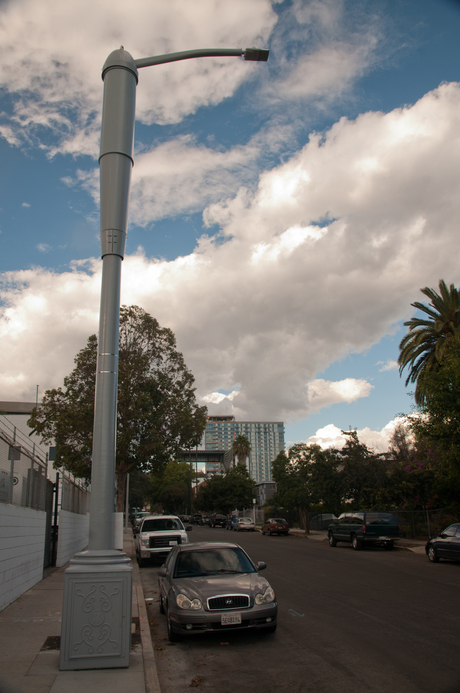Wireless LED streetlights for Los Angeles

Los Angeles will be the first city in the world to deploy 100 Philips SmartPoles — LED streetlights that come with 4G LTE wireless telecommunications technology.
The company recently announced the news, noting that the integrated cellular technology is created by Ericsson.
In addition to providing energy-efficient lighting for safer, brighter streets, Philips said the SmartPole will improve the wireless network in dense urban areas by providing broadband coverage to businesses and residents.
With cellular data traffic expected to grow nine times by 2020, according to the Ericsson Mobility Report, and current telecoms infrastructure struggling to respond to this demand, the SmartPoles will enable seamless mobile wireless 4G LTE connectivity, with Ericsson’s small cell technology housed in the poles to increase data capacity in the network.
Philips SmartPoles were designed and tested to accept FCC licensed wireless mobile network operator equipment, granting an alternative deployment method for 4G LTE broadband services, which will connect each pole through a fibre link to its core network.
“We are now taking advantage of previously untapped real estate to give our streets better broadband connectivity and future-ready infrastructure,” said LA’s Mayor, Eric Garcetti.
Earlier this year, LA was also the first city in North America to monitor and control its street lighting through Philips CityTouch, a streetlight asset management system that uses mobile and cloud-based technologies.
Ericsson Senior Vice President and Head of Business Unit Radio Arun Bansal said LA will be a role model for other smart cities that place sustainability and connectivity high on their agenda.
“As citizens, businesses and industries transform through mobility, cities have an increasingly important role to play as eco-system partners enabling the next wave of innovations that will bring us to 5G in 2020,” said Bansal.
“Innovative solutions like Philips SmartPoles and Ericsson Zero Site that efficiently improve the performance of mobile networks will be necessary to address the growing demand from both smartphone users and the Internet of Things.”
For mobile network operators this will offer new possibilities to improve data coverage and capacity for citizens so there are no more signal dropouts.
Aust solar farms to deploy Canadian anti-hail tech
Australian energy retailer Flow Power is teaming up with Canadian Solar to deploy the...
Praise for Senate committee report into electrification
Rewiring Australia has welcomed a report into residential electrification carried out by a...
Endeavour Energy launches new community battery program
76 new batteries will be delivered across the Illawarra, South Coast, Greater Western Sydney,...




